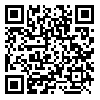مجله رویش روانشناسی از دادن گواهیهای کاغذی معذور است. لطفا تقاضا نکنید. همه گواهی ها در صفحه شخصی کاربران موجود است.
year 13, Issue 9 (Atumn 2024 2024)
Rooyesh 2024, 13(9): 1-10 |
Back to browse issues page
Research code: A-10-11351-1
Download citation:
BibTeX | RIS | EndNote | Medlars | ProCite | Reference Manager | RefWorks
Send citation to:



BibTeX | RIS | EndNote | Medlars | ProCite | Reference Manager | RefWorks
Send citation to:
Lak M, Bagherian R. (2024). Investigating the mediating role of maladaptive metacognitive beliefs in the relationship between personality traits of neuroticism and conscientiousness with symptoms of insomnia and nightmares in Isfahan University students. Rooyesh. 13(9), 1-10.
URL: http://frooyesh.ir/article-1-5251-en.html
URL: http://frooyesh.ir/article-1-5251-en.html
1- MA Student of health psychology, Department of health psychology, Faculty of Medical Sciences, Isfahan university of medical science, Isfahan, Iran. , Marzielak1377@gmail.com
2- Professor of clinical psychology, Department of health psychology, Faculty of Medical Sciences, Isfahan University of medical science, Isfahan, Iran.
2- Professor of clinical psychology, Department of health psychology, Faculty of Medical Sciences, Isfahan University of medical science, Isfahan, Iran.
Abstract: (1575 Views)
The present study was conducted to investigate the mediating role of maladaptive metacognitive beliefs in the relationship between the personality traits of neuroticism and conscientiousness with the symptoms of insomnia and nightmares. The research method used was descriptive correlation and structural equations. The research community was formed by all the students of Isfahan University in 1402, among whom 377 people were selected as a sample. In collecting data from the Big Five Personality Factor Questionnaire (FFPQ, Goldberg, 1999), Insomnia Disorder Questionnaire (ISI, Morin, 1993), Disturbing Dream and Nightmare Questionnaire (DDNSI, Krakow, 2002), and Discordant Metacognitive Beliefs Questionnaire (MCQ), Wells, 1997) was used. The results showed that the proposed research model was a good fit. The findings also revealed that the direct path of neuroticism variables to maladaptive metacognitive beliefs, neuroticism to insomnia, and maladaptive metacognitive beliefs to nightmares was significant (p<0.05). Other results showed that the indirect path of neuroticism variable to nightmares through maladaptive metacognitive beliefs was substantial (P <0.05) and the indirect path of neuroticism and conscientiousness variables to insomnia through maladaptive metacognitive beliefs and neuroticism variable. Nightmare conscientiousness through maladaptive metacognitive beliefs was not significant (p<0.05). From the above findings, it can be concluded that only the personality trait of neuroticism can affect the symptoms of nightmare disorder in Isfahan University students through maladaptive metacognitive beliefs.
Keywords: Maladaptive Metacognitive Beliefs, Insomnia, Neuroticism, Nightmare, Conscientiousness, Personality.
Type of Article: Research |
Subject:
Clinical Psychology
Received: 2024/03/27 | Accepted: 2024/08/12 | ePublished: 2025/01/20
Received: 2024/03/27 | Accepted: 2024/08/12 | ePublished: 2025/01/20
Send email to the article author
| Rights and permissions | |
 |
This work is licensed under a Creative Commons Attribution-NonCommercial 4.0 International License. |





